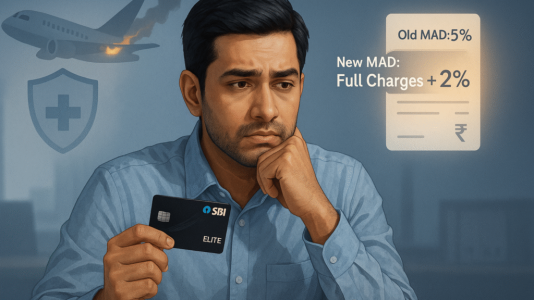Pravin2407
KF Rookie
Just a few days after the tragic Air India Express crash in Ahmedabad that claimed more than 240 lives, SBI Card has come out with major updates that could impact many users. While the timing might be coincidental, the removal of complimentary air accident insurance from several SBI credit cards has raised questions, especially with travel safety under renewed focus.

Air Accident Insurance to be Discontinued
From July 15, 2025, SBI Card will discontinue air accident insurance on cards like SBI ELITE, PRIME, Pulse, and Miles series. This change affects all new and existing users of SBI-branded cards. Co-branded cards will see the same update by August, depending on the partner. Earlier, this coverage offered up to ₹1 crore on ELITE and Miles Elite cards and up to ₹50 lakh on PRIME, Pulse, and Miles Prime. While most users didn’t rely on this feature actively, it did add a layer of protection for frequent flyers.
With this benefit going away, users who travel often may want to explore standalone travel insurance policies, particularly those who used to count on credit card protections in emergencies.
Changes to Minimum Amount Due (MAD)
Alongside the insurance update, SBI Card is also introducing a new way of calculating the Minimum Amount Due (MAD) starting July 15. The revised formula will now include 100% of all finance charges, EMIs, fees, and taxes, plus 2% of the remaining retail balance. This is a major shift from the current flat 5% model and will increase the payable amount for users who revolve credit.
This move appears aimed at reducing long-term debt accumulation by encouraging faster repayments. Users with regular EMIs or who carry balances month to month will need to adapt their payment planning accordingly.
New Payment Allocation Order
SBI Card is also changing the way payments are applied. Going forward, payments will first go towards taxes, finance charges, EMIs, and fees—only after that will any payment be applied to regular retail purchases. This change can help reduce hidden interest buildup, especially for users who make partial payments.
What You Should Do
If you’re an SBI cardholder, now is the right time to check if your card still meets your needs. The reward structure and annual fees haven’t changed, but with the removal of air insurance and more aggressive billing updates, those who carry balances or travel frequently may want to reevaluate.

Air Accident Insurance to be Discontinued
From July 15, 2025, SBI Card will discontinue air accident insurance on cards like SBI ELITE, PRIME, Pulse, and Miles series. This change affects all new and existing users of SBI-branded cards. Co-branded cards will see the same update by August, depending on the partner. Earlier, this coverage offered up to ₹1 crore on ELITE and Miles Elite cards and up to ₹50 lakh on PRIME, Pulse, and Miles Prime. While most users didn’t rely on this feature actively, it did add a layer of protection for frequent flyers.
With this benefit going away, users who travel often may want to explore standalone travel insurance policies, particularly those who used to count on credit card protections in emergencies.
Changes to Minimum Amount Due (MAD)
Alongside the insurance update, SBI Card is also introducing a new way of calculating the Minimum Amount Due (MAD) starting July 15. The revised formula will now include 100% of all finance charges, EMIs, fees, and taxes, plus 2% of the remaining retail balance. This is a major shift from the current flat 5% model and will increase the payable amount for users who revolve credit.
This move appears aimed at reducing long-term debt accumulation by encouraging faster repayments. Users with regular EMIs or who carry balances month to month will need to adapt their payment planning accordingly.
New Payment Allocation Order
SBI Card is also changing the way payments are applied. Going forward, payments will first go towards taxes, finance charges, EMIs, and fees—only after that will any payment be applied to regular retail purchases. This change can help reduce hidden interest buildup, especially for users who make partial payments.
What You Should Do
If you’re an SBI cardholder, now is the right time to check if your card still meets your needs. The reward structure and annual fees haven’t changed, but with the removal of air insurance and more aggressive billing updates, those who carry balances or travel frequently may want to reevaluate.
Last edited:
